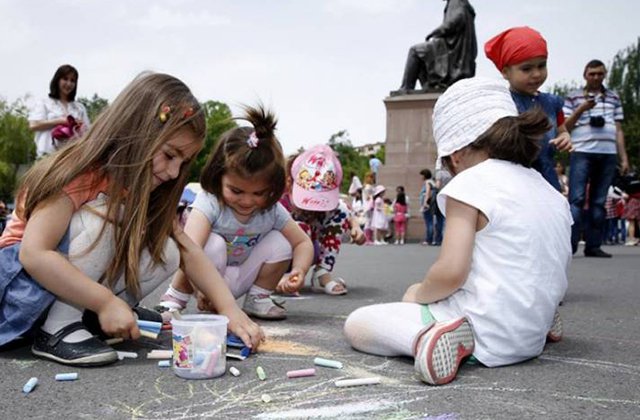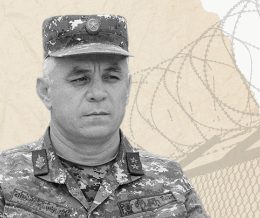
Children should live in their future, and not in our past

In a talk with a group of children from an ordinary school I learned that they don’t want to grow up. It’s interesting to hear it, as when we were young, we wanted to grow up soon. When I asked the children, “Why don’t you want to grow up?” I had this reply, “The elderly complain of their lives so much, that we don’t’ want to grow up and feel that hardship on us.”
Children’s life has considerably changed in the 21st century. In the previous era main job of the children was playing in the yard, as they were free. Not accidentally translated from Greek “school” means free time.
Today children aren’t free, as business industry does everything to make children busy. Everything is done to make children actors of economic life. At an early age children become consumers of technical gadgets, computer games, different apps, soap operas, fast food. All this keeps children busy by diverting them from their childhood. Commercialization of childhood is taking place.
This is peculiar to all countries. Which are the main issues of the children in Armenia?
Last year Statistical Service of Armenia issued a research on child’s work. Based on research children aged 5-17, 52 thousand children work in Armenia. It comprises 11% of children at that age. Moreover, around 11 thousand from those children are aged 5-11. The law allows such children work only in exclusive cases. For instance, appearing in films or ads. 39 thousand of those children do banned work, i.e. they work more than allowed or implement transportation of heavy burden, or do harmful work. Children in Armenia are busy with agricultural work. Especially in September-October children, mostly on account of lessons, work in fields and gardens.
Children’s work is a result of high poverty index. Every 3rd child is poor in Armenia. However, besides poverty, there is another issue in Armenia—socially needy. Needy are considered not only poor children, but children not poor materially, who aren’t able to realize their rights. For instance, they study in schools with bad conditions, don’t go to kindergartens, have no entertainment opportunities, have no friends, have no possibility to attend entertainment groups. Last year UN Children’s Fund Armenia Office conducted a research to study need of children. As a result it turned out that 36% of children in Armenia are not poor, but needy. Condition of children in villages is particularly hard. 82% is needy. These are bothering indices. We like to say children are our future. But we don’t speak of what we inherit to our children. We bring them into life, but we don’t assume responsibility to create a better world for the children. Assume responsibility for the world. We need this. This is the reason that every day, every hour, talent dies in our children. We shouldn’t allow that poverty conditioned by the situation became generation or conscious poverty. In case of such losses societies have to spend decades to return the lost.
One of productive means to overcome children’s poverty is education. But here serious issues are available. Many countries in the world allot big sums of money for education of poor children, as children’s needs are bigger. In Armenia the same amount is allotted for the education of non-poor children, which isn’t correct.
Children in wealthy families attend private classes beyond education in school and gain big privilege over the poor. Under current state of affairs educational system doesn’t serve as a social lift for a poor child.
25 years ago on June 1 Armenia accessed UN Convention on the Rights of the Child. Article 12 of that Convention is very important. It’s stated that children have the right to express their opinion, have the right to be heard by the adults. This article in specialized literature is qualified as a provision guaranteeing the rights of children’s participation. Unfortunately, children aren’t heard in Armenia.
One of the reasons may be the fact that in Armenian the word “listen” has direct and indirect sense. Indirectly listen to the child means do what he/she says. But let’s not forget direct sense. Listening to the child means making him/her participant, develop the ability to have personal view and assume responsibility for the world. Nowadays children don’t want to be an audience or a passenger. They want to be a part, for that they need to be heard.
There is a wonderful teacher in Yerevan’s Vardanank complex—Meri Torunyan. Once I asked what’s the secret of her professional success, she said, “I like to listen to the children and learn from them.”
Unfortunately, we rarely listen to the children. Very often we attempt to urge them our unrealized dreams, or clichés, not understanding that those children should live in their future, and not in our past. As wise Kahlil Gibran said, “Children belong to the life, and not to us.”
Children aren’t the reason of problems. Children are resources given to us to solve them. Children aren’t expenditures. Children are investment tended to future.
Let’s think over leaving a better world to the children, and leaving better children to the world.
By Serob Khachatryan























